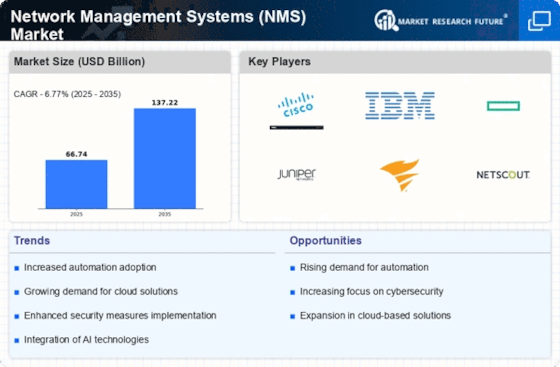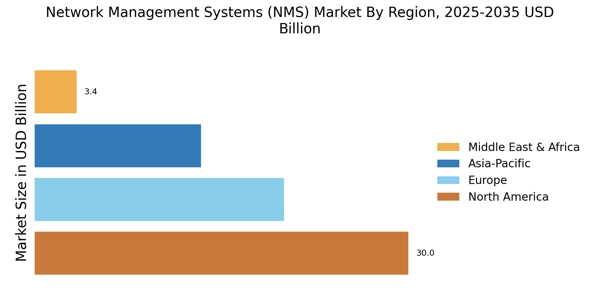Adoption of IoT Devices
The proliferation of Internet of Things (IoT) devices is significantly influencing the Network Management Systems Market (NMS) Market. As more devices connect to networks, the complexity of managing these connections increases. This complexity necessitates robust NMS solutions capable of handling vast amounts of data and ensuring seamless communication between devices. The market for NMS is expected to grow as organizations seek to implement effective management strategies for their IoT ecosystems. With an estimated 75 billion IoT devices projected to be in use by 2025, the demand for sophisticated NMS tools that can monitor, manage, and secure these devices is likely to escalate, driving market growth.
Shift Towards Automation
The shift towards automation in network management is a key driver for the Network Management Systems Market (NMS) Market. Organizations are increasingly adopting automated solutions to streamline their network operations, reduce human error, and enhance efficiency. Automation tools within NMS solutions enable real-time monitoring, automated troubleshooting, and proactive management of network resources. This trend is likely to accelerate as businesses seek to optimize their operations and reduce operational costs. The market for NMS is projected to grow as companies recognize the benefits of automation, with forecasts suggesting a compound annual growth rate of over 10% in the coming years.
Growing Focus on Network Security
The escalating focus on network security is a pivotal driver for the Network Management Systems Market (NMS) Market. As cyber threats become more sophisticated, organizations are compelled to invest in advanced NMS solutions that incorporate robust security features. These solutions not only monitor network performance but also provide essential security measures to protect against potential breaches. The market is witnessing a surge in demand for NMS tools that offer integrated security functionalities, such as threat detection and response capabilities. With cybersecurity spending projected to exceed USD 150 billion by 2025, the NMS market is likely to benefit from this trend, as organizations prioritize securing their networks.
Regulatory Compliance Requirements
Regulatory compliance is becoming increasingly stringent across various sectors, thereby impacting the Network Management Systems Market (NMS) Market. Organizations are required to adhere to numerous regulations concerning data protection, privacy, and network security. This has led to a surge in demand for NMS solutions that can assist in maintaining compliance with these regulations. Companies are investing in NMS tools that provide comprehensive reporting and monitoring capabilities to ensure they meet regulatory standards. The market is expected to witness growth as businesses prioritize compliance, with an estimated increase in spending on NMS solutions to support these initiatives, potentially reaching USD 8 billion by 2025.
Rising Demand for Network Reliability
The increasing reliance on digital infrastructure has led to a heightened demand for network reliability within the Network Management Systems Market (NMS) Market. Organizations are increasingly recognizing that network downtime can result in substantial financial losses and reputational damage. As a result, investments in NMS solutions are surging, with the market projected to reach USD 10 billion by 2026. This trend is driven by the need for continuous network monitoring and management to ensure optimal performance and availability. Companies are seeking advanced NMS tools that can provide real-time insights and proactive management capabilities, thereby enhancing their operational efficiency and reducing the risk of outages.

















